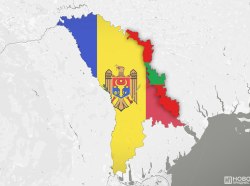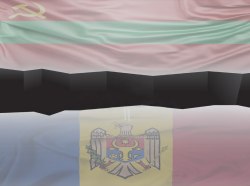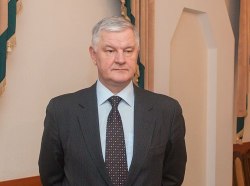Last week our agency published the article Pridnestrovie: A Three-Component Challenge to Russia by the famous Russian journalist and blogger Semyon Uralov. We phoned the author to learn the expert's opinion on the risks the country is facing and solutions to burning problems.
Hallo, Semyon. In your latest article on Pridnestrovie you argued there was a hybrid war against our country. Could you clarify what this means?
Hallo. In order to understand what the hybrid war is you should look at the current events from yet another angle.
Just a few days ago members of a radical raiders' organisation Automaidan blocked for several hours the international road Tiraspol-Odessa in Odessa region.
This apparently Ukrainian domestic event had nothing in common with Pridnestrovie. But in reality its only aim was the blockade of Pridnestrovie. The aim is to stop the turnover between Pridnestrovie, Ukraine's Bessarabia and Odessa. And it is the break-up with Odessa that is very undesirable for Pridnestrovie and especially its economy. And Odessa airport was a very convenient connecting link for the Pridnestrovians connected in business with Moscow.
Now the logistic flows have shifted towards Moldova, thus strengthening the dependence of Tiraspol from the Kishinev authorities. In other words, Pridnestrovie's negotiation positions have weakened.
Thus, the activities of Odessa's Automaidan raiders near the state border do not only cause economic losses, but also the reduction in foreign policy influence.
The situation is even more aggravated, taking into account merely financial losses of commercial facilities.
This is what the hybrid war is when non-military means are applied to achieve global political and, what is more, economic goals. It seems to you, there is a political show, but meanwhile you are being robbed. The hybrid war is a political post-modernism. And as any post-modernist form, the hybrid war is very cynical.
If comparing the volume of turnover between the PMR and Ukraine in pre-blockade and blockade periods, it can be calculated that the losses have amounted to 15-20 per cent of GDP.
When analysing Pridnestrovie's situation, you should always bear in mind that its domestic market is only 500,000 persons. A half a million is not even a regional level micro market in Russia or Ukraine. The population of Ukraine's smallest region - Chernovtsy - is a bit fewer than a million of inhabitants.
Pridnestrovie is not simply a region, it is a micro region. And as any micro region, it requires the state's micro management. It not only possible, but even necessary to introduce a manual control of economy in Pridnestrovie. The market size allows the state to become a chief player in Pridnestrovie's economy within a short time.
But there is an evident monopoly in some sectors of the Pridnestrovian economy, including such priority areas for the state security as communications. And tax revenues chiefly depend on the activities of the Sheriff group companies. What shall the state do to establish new rules in the game?
In fact, the crucial dependence of the Pridnestrovian economy on the private capital accumulated by the Sheriff corporation cannot but raise substantial concerns. Besides, Moldova and Ukraine provide the most dismaying examples of oligarchical economy.
Oligarch Plahotniuc exercise almost complete control over Moldova. Ukraine has been disrupted by the oligarchical clans of Poroshenko, Kolomoyskiy, Firtash, Timoshenko and Levochkin.
The solution lies in the very nature of private capital. After becoming supercapital any big capital competes with the public capital and strives for political dominance.
It starts to penetrate into public authority structures, striving to be the authority itself. Alongside its merging with public authorities, the capital begins to corrupt the state. There are attempts to privatise the most profitable assets. The supercapital corrupts the state machinery by bribing; it buys court decisions and promotes its people to responsible posts.
The oligarchy has always striven and will strive to privatise some part of governmental authority and property. It has nothing to do with good or bad oligarchs. The class behaviour of any oligarch - Ukrainian, Moldovan or Pridnestrovian - is alike.
Moreover, all post-Soviet oligarchs actively interact and have joint businesses. We suffer from the inconvenience caused by borders (for instance, Pridnestroive's severance from Odessa), but there are no borders for oligarchs and big capital. There are no national passports and other restrictions invented to drive the masses of workers, peasants, managers, public employees and other social groups into national states.
It is peculiar that the super capital and national oligarchy act in the same way: first the private capital reduces tax payments to the national budget and transfers big tranches to offshore zones, thus provoking a crisis in the financial sector. Then, amid the financial crisis, private corporations try to privatise the state authority through the parliament.
Through the parliament? Pridnestrovie's Supreme Council is the country's legislative body. In which way can it be privatised?
Of course, the "privatisation of parliament" is a form of this very hybrid war. It is clear that it is impossible to literally privatise the Supreme Council, Ukraine's Verkhovna Rada or Russia's Duma. But it is possible to exert political influence on a part of legislators.
The parliament is a collegial body where full authority is shared a hundred or less of people. That is, an individual parliamentarian has negligible authority, whereas a group of parliamentarians has a political will. Accordingly, the parliamentary majority is a kind of monopoly.
That is, the supercapital (corporation, oligarchy) strives for its natural state - monopoly. The oligarchy cannot do without private monopolies, and private monopolies always give birth to the oligarchy. This is the dialectic of a hybrid war.
The only way to combat the oligarchy is to establish the state monopoly as only the state as an impersonal subject can resist the private capital, which is based on private motivations of its investors.
That's what happens in the PMR. The Sheriff corporation has long had "its own" MPs in the Supreme Council and often lobbies the necessary bills.
It is natural. This is a natural behaviour of any oligarchy. The temptation to privatise a part of state authorities through the parliament is the greatest temptation. This is what the political history of any country tells us.
Besides, national peculiarities should be taken into account. The Pridnestrovian people is a mixture of Russian, Ukrainian and Moldavian nations and cultures. And oligarchs have been a permanent phenomenon in the Ukrainian, and especially Moldovan history. Moldova used to be ruled for many years by Phanariote Greeks who robbed the Moldavian nation under the auspices of the Ottoman Empire. Ukraine's Cossack republic degenerated into magnate families, who dragged Ukraine apart between Poland, Russia and Turkey.
There was the February Revolution in the Russian history, when the national oligarchy came to power. The Time of Troubles was the offspring of boyars' ruling. And the boyar is an oligarch in the 16-17th centuries.
Do you mean that the privatisation of state institutions and oligarchs' coming to power is inevitable? Can we not avoid it?
Why not. On the contrary. You must do your best to avoid it. It is vital to strengthen the state's influence in all sectors: economy, politics, culture and ideology.
The state authorities must be supported by the masses because the only working model of power in ex-USSR countries is the "supreme ruler" relying on the masses. That's how the system works in Belarus, Kazakhstan, Uzbekistan and Russia. You may criticise this system and sympathise with, say, the Chinese model - the collective power in the form of Politburo, but you must admit the efficiency of the Russian-Belarus-Kazakh-Uzbek model. Whatever attitude towards it we might have.
I think Pridnestrovie is not an exception.
PS by Semyon Uralov: Pridnestrovie is my favourite republic - the last splinter of the USSR, which I travelled through from Bendery to Kamenka when I worked in Odessa.
Thank you, Semyon, for the sincere interview and detailed answers








